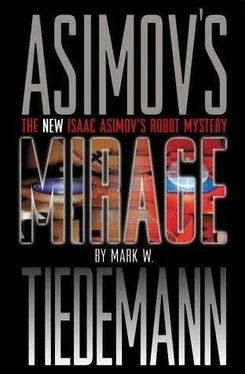Mark Tiedemann - Mirage
Здесь есть возможность читать онлайн «Mark Tiedemann - Mirage» весь текст электронной книги совершенно бесплатно (целиком полную версию без сокращений). В некоторых случаях можно слушать аудио, скачать через торрент в формате fb2 и присутствует краткое содержание. Год выпуска: 2000, ISBN: 2000, Издательство: IBooks, Жанр: Фантастика и фэнтези, на английском языке. Описание произведения, (предисловие) а так же отзывы посетителей доступны на портале библиотеки ЛибКат.
- Название:Mirage
- Автор:
- Издательство:IBooks
- Жанр:
- Год:2000
- ISBN:ISBN: 0-671-03910-5
- Рейтинг книги:5 / 5. Голосов: 1
-
Избранное:Добавить в избранное
- Отзывы:
-
Ваша оценка:
- 100
- 1
- 2
- 3
- 4
- 5
Mirage: краткое содержание, описание и аннотация
Предлагаем к чтению аннотацию, описание, краткое содержание или предисловие (зависит от того, что написал сам автор книги «Mirage»). Если вы не нашли необходимую информацию о книге — напишите в комментариях, мы постараемся отыскать её.
Mirage — читать онлайн бесплатно полную книгу (весь текст) целиком
Ниже представлен текст книги, разбитый по страницам. Система сохранения места последней прочитанной страницы, позволяет с удобством читать онлайн бесплатно книгу «Mirage», без необходимости каждый раз заново искать на чём Вы остановились. Поставьте закладку, и сможете в любой момент перейти на страницу, на которой закончили чтение.
Интервал:
Закладка:
"None to speak of." He gestured at the datum. "Uh, the RI?"
"Oh, yes." She touched a few more contacts. "There's the schema for this branch."
Derec leaned over the desk and studied the screen. "All right… there's a service entrance here for the robot staff. It says it's been sealed off."
"Be my guest." She smiled ruefully. "If you get caught, this office will deny any knowledge"
Derec snorted and turned away. Ariel laughed.
The hallway outside the offices made a sharp turn at the very back and narrowed even more. It was barely wide enough for a single person carrying a tray now, which was more than enough room for a robot with the same tray.
It opened into a circular chamber containing three wall niches, now empty of robots. As a concession to Terran authority, even the embassy robots had been slaved to the RI here. To his left was a plain metal door with a simple positronic scanner. Below the scanner was an override control.
From his jacket pocket, Derec took out a small square that resembled an ID chit. Its surface, however, showed the faint outlines of a keypad and one edge was thicker than the rest of the square. He was proud of this device, though he had never before found it necessary to use. He slid it into the override scanner and pressed one of the contacts. A moment later, one contact lit up. He pressed the next and so on until the door accepted the code the device had developed from its interaction with the mechanism and slid open.
The only illumination in the tunnels beyond came from clusters of readylights. Derec felt his way along until he came to a brighter area, then he stepped from the robot accessways into a human-use passage lined with dim amber panels. He followed it until he came to a branch, then guessed from memory which way he needed to go.
The machinery that operated all the station facilities surrounded the public areas, hidden in the walls and beneath the floors. Peel away the skin inside and outside Union station and a network of tubes, corridors, conduit, shafts, and cables would be revealed, resembling in its complex density the internal organs of a living thing. Since it had been retrofitted for the RI and robotics, a good deal of the network contained open spaces for humans, service nodes and maintenance stations, which made it easier for Derec to find his way. Signs were posted giving locations and directions.
It was late. Derec thought it unlikely that he would run into any workers at this hour, but he walked carefully anyway.
He wanted to find one of the maintenance nodes, since the curious data loops Rana had found all centered on maintenance nodes. They were scattered throughout the complex network, junctions which served several purposes, beginning with the monitoring of the data traffic that rushed throughout the system at light -speed. The junctions broke down the task of maintaining, repairing, and supervising the day-to-day functions that kept Union Station working into discreet units, each with its own supply and repair staff. Until the Incident, that staff had been robotic. Prior to the installation of the RI and the station's conversion to positronics, humans did the work. Now, Derec imagined, they would again.
He turned a corner and lurched back at the sight of a row of people. He waited for them to come after him. When they did not, he looked again and saw that it was only a row of robots in their niches.
Pulse racing, he quickly walked by them.
A maintenance node stood at the end of the row. Derec squeezed through the narrow opening, into the hexagonal chamber. A worklamp came on automatically at his presence.
The node was being disassembled. Cables and router boxes hung from their places, forgotten for the time being, a mess. Derec tried to piece together how it would operate, but too much was missing. He lifted one of the router boxes and turned it over. One face looked pitted, hundreds of tiny holes allover it, the plastic casing discolored as if it had been heated. He found two more in about the same condition.
The next one, though, was intact.
He opened the access doors and peered in at the neatly organized components. Nothing looked disturbed. He pushed and pulled at cables to get his hands inside the mass, feeling around for… he did not know.
But he found it in one of the racks at the base of the walls.
The space was filled with transfer buffers, large memory dumps that held the millions of bits of data required by the station until needed. Tucked between two of them was a mass of greenish-blue corrosion.
No, not corrosion. More like mold or some other fungus. Derec prodded it, but the surface did not yield, nor did it seem brittle. It appeared to be grown to the transfer buffers. He worked a fingernail into the join between a buffer wall and the growth and pried. Fibrous tendrils had sunk into the buffer.
He had nothing on him to work at the material. He went back to one of the other maintenance nodes, where the work crew had left some tools, and took a plain screwdriver. He pried and chipped at the growth until a small amount flaked off. He wrapped it in the printout from the station and slipped it into his pocket.
He made his way back to the embassy branch, unable to shake the growing sense of dread that seemed to spread over and through him.
Sixteen
The robot caused Ariel to flinch every time she saw it. She brushed past it, impatient with her own reactions, and strode into her living room, Derec close behind.
Mia was still on the sofa, her datum in her lap, the subetheric on, frozen at a scene from the massacre. It showed, magnified, a clutch of people huddling together, faces stretched in panic, bodies twisted and angled as if about to fall to the floor. From the clothing, the group was Terran. Ariel recognized no one. The image was so different from the scene she had seen in Union Station not two hours ago that it seemed from another reality.
Mia looked up.
"And?" she asked archly.
Ariel stared at the image. "All present and accounted for, including you. Someone has thoughtfully put a burned body in your morgue stasis drawer."
The expression on the younger woman's face made Ariel immediately regret her words. Mia's mouth fell partly open and she paled visibly, her eyes seeming to go darker still and more desolate.
"We checked at Union Station," Derec said, "and someone calling himself Tro Aspil did show up to take his seat on the shuttle. So either the corpse in the morgue is Aspil and someone else is heading for Aurora-"
"-or Aspil's body is a fake," Mia said, nodding. "Like mine."
"But your double doesn't even have to look like you," Ariel said. "The only way to prove it isn't you would be a DNA scan."
"I'm sure that has already been flied," Mia said. She gave her shoulders a twist as if to relieve tension, then pointed at the screen. "I've been doing a tally."
Ariel sat down on the sofa beside her. Mia's datum screen showed two columns of names.
"Bogard had a master list of everyone scheduled to be at the ceremony," Mia said. "I pulled a list of casualties from the newsnets and started running the vids for a match."
"Any discrepancies?" Ariel asked.
"None so far, but I began doing trajectories. When we found out that several of the assailants were just projections, I wondered then just how many real shots were fired. Bogard helped me edit the newsnet recordings you have into a single composite."
"How are you doing the tracking?" Derec asked. "Bogard's sensory net is as good as it gets, but even subetheric recordings don't have that kind of detail."
"Bogard was able to identify nine actual shooters out of the twenty-one apparent assailants. By studying the recoil of their weapons, it gives us a reliable estimate of how many shots were actually fired. Then it's just a matter of tracing the consequences."
Читать дальшеИнтервал:
Закладка:
Похожие книги на «Mirage»
Представляем Вашему вниманию похожие книги на «Mirage» списком для выбора. Мы отобрали схожую по названию и смыслу литературу в надежде предоставить читателям больше вариантов отыскать новые, интересные, ещё непрочитанные произведения.
Обсуждение, отзывы о книге «Mirage» и просто собственные мнения читателей. Оставьте ваши комментарии, напишите, что Вы думаете о произведении, его смысле или главных героях. Укажите что конкретно понравилось, а что нет, и почему Вы так считаете.












